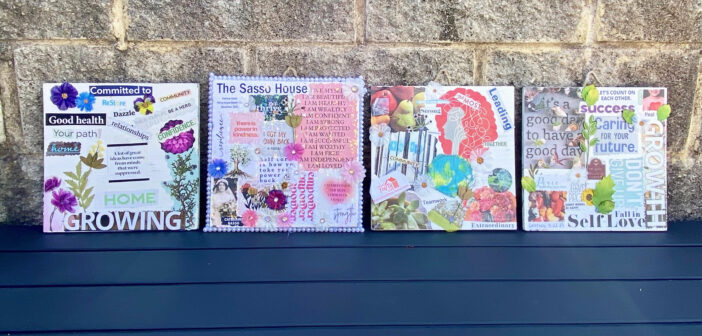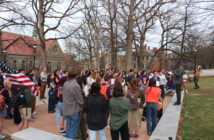In 2019, Pennsylvania ranked ninth in the nation for the highest number of new human trafficking cases.
According to the Federal Human Trafficking Report, the state also ranked fourth in active cases and number of defendants convicted.
Human trafficking includes “peonage, slavery, forced labor, sex trafficking, sexual exploitation and other abuse of children, and transportation for illegal sexual activity and related crimes,” according to the U.S. Department of Justice.
The Sasso House in the Lehigh Valley, a safe home for survivors of human trafficking, provides transitional living support. There, the THRIVE program serves survivors in alignment with its name, which stands for transitional housing, resilience, independence, victoriousness and empowerment.
The THRIVE program is run by Valley Youth House, a nonprofit that has operated in Bethlehem for almost 52 years. Those in the THRIVE program live at the Sasso house, as participation requires staying at the transitional living site.
Sarah Pammer, communications specialist for Valley Youth House, said Valley Youth House operates around 87 different programs to aid youth and their families who are homeless, victims of abuse or struggling with mental health.
Pammer said the Valley Youth House’s mission is to help young people come to a place where they can have a successful future and define what success means for themselves.
Alycha Boehm, clinical supervisor of northeast programs at Valley Youth House, founded the THRIVE program in 2021 with Megan Sell, the program’s current supervisor.
Boehm said THRIVE is a transitional living site for 14- to 21-year-old female-identifying human trafficking survivors. It’s a low-barrier-to-entry program where survivors receive life skills, case management needs and healing trauma therapy.
Since 2021, THRIVE has helped 34 survivors of human trafficking.
The program is run in the Sasso House — a house unidentifiable to an outsider. Sell said the house’s location is kept confidential to protect the survivors it serves.
She said the house was intentionally designed and decorated to provide comfort for its residents. There are six beds, two bathrooms, two living spaces, a group therapy room and a backyard space that make it feel like a home.
Boehm said residents stay for a minimum of six months with most graduating after two years.
THRIVE was initially funded by a grant from the Department of Justice, and while operating under these funds, the program was able to support youth previously living on the street.
The grant has since run out.
Tom Harrington, the executive director of the Valley Youth House, called Pennsylvania State Representative Josh Siegel in April to ask for his help. Siegel since announced $150,000 in state funding would go toward supporting the THRIVE Program on Sept. 18.
Boehm said the money is primarily for sustaining the program and maintaining the resources to house six residents.
Sell said since the Department of Justice grant was depleted, the program no longer has the funding to support youth coming from street-level homelessness. Under the new state funding, they now only accept youth already involved with county care or juvenile probation.
She said most youth likely wouldn’t know about THRIVE without referrals from the counties, but they hope to be able to accept youth from street-level homelessness again in the future.
Boehm said continual funding is crucial for expanding their ability to serve youth.
“We’re always going to be needing funding,” Boehm said. “Six beds is not nearly enough for how many youth need services.”
According to the National Human Trafficking Hotline, 606 trafficking signals were received by the hotline in Pennsylvania in 2023.
Of the 220 cases identified, 469 victims were involved.
Boehm said while hotline calls provide a general idea of which states are more informed about trafficking cases, they don’t reflect the actual number of cases reported.
Sell said this is one reason human trafficking remains an underreported crime.
According to the Commercial Sexual Exploitation Institute, six of the 93 cases of human trafficking that have led to a conviction in the past ten years occurred in Lehigh County.
Boehm said there is a misconception that trafficking only occurs in large cities or overseas.
“This is an incredibly invisible crime,” Boehm said. “This is incredibly misunderstood. It is absolutely happening in Lehigh County. It’s happening in every county in every state.”
While THRIVE serves areas in the Lehigh Valley, survivors from as far as the Pittsburgh area have gone to the Sasso House.
Boehm said the program is still gaining traction, and they hope to open houses beyond the Lehigh Valley in the future. This would allow them to serve other populations of different ages and genders.
Intended to raise awareness through facilitating events across the Lehigh Valley, the annual Lehigh Valley Anti-Trafficking Week organized by the Lehigh Valley Anti-Trafficking Collaborative will take place Nov. 1 through Nov. 8.
Boehm said this week is a great time for THRIVE’s past members to reunite and enjoy the community they’ve built.
Sell said it’s a privilege to provide a space for survivors to seek refuge.
While THRIVE employees provide a community of support for survivors, Sell said there’s a learning curve that comes with her work. She said THRIVE is an opportunity for change, but survivors have to make their own choice to receive support on their own.
This choice is often hard for survivors due to emotional trauma and shame that prevents them from wanting to seek help. Sell said this is one reason why THRIVE aims to create a healing community, as the program presents an opportunity for survivors to build their own sense of a family beyond their past experiences.
“My desire (is) to provide an opportunity and a loving environment when the world has not been kind,” Sell said.
Boehm said survivors are not saved by the program — they save themselves.
She said their identities extend far beyond just being survivors.
“The most rewarding part for us is to see them just be kids and to give them normalcy,” Boehm said. “To (provide) space for them to be able to realize what their passions are and who they are is the whole point of what we do.”






Comment policy
Comments posted to The Brown and White website are reviewed by a moderator before being approved. Incendiary speech or harassing language, including comments targeted at individuals, may be deemed unacceptable and not published. Spam and other soliciting will also be declined.
The Brown and White also reserves the right to not publish entirely anonymous comments.